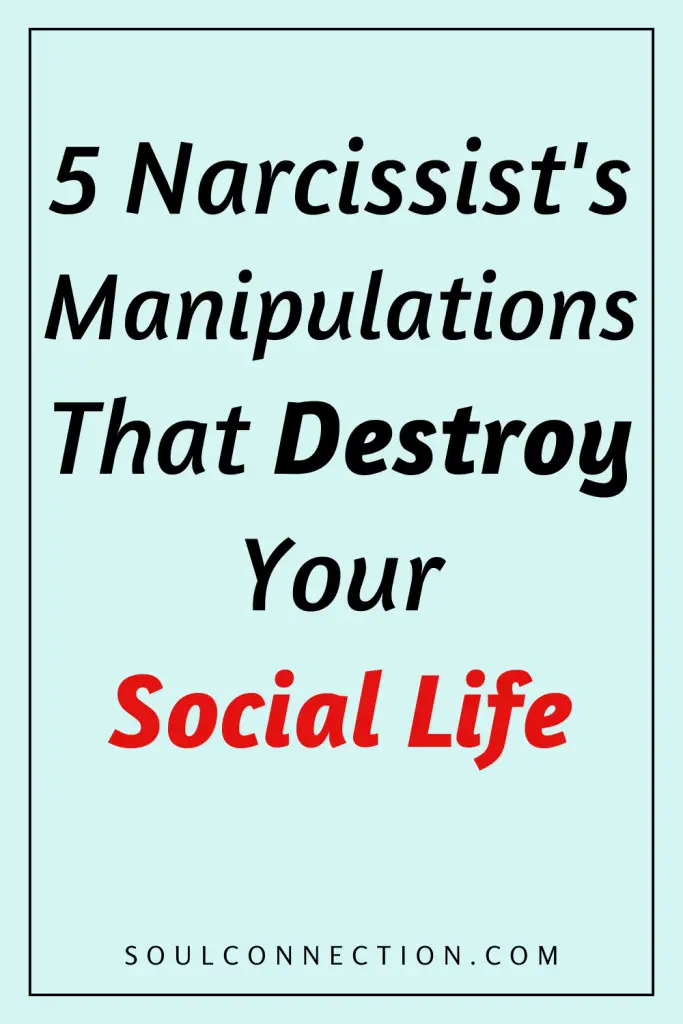Turns out, having a narcissist in your social circle is about as fun as a paper cut on a lemon-squeezing finger.
If your friendships seem to wither mysteriously, or group chats dry up like a forgotten houseplant, there’s a decent chance you’ve got a master manipulator in the mix.
Let’s unpack the greatest hits of narcissistic sabotage—five moves guaranteed to leave your social life limping—and, more importantly, what you can do to stop starring in their drama series.
1. Gaslighting the Group Dynamic
Narcissists don’t just gaslight their partners—they love to marinate whole friend groups in confusion. Picture this: You’re at brunch, you mention that wild story from last weekend, and suddenly the narcissist interrupts.
“That never happened. You must be misremembering.” Cue the chorus of shrugged shoulders and awkward glances. It’s like being in an episode of “The Twilight Zone,” except you didn’t sign up for a starring role.
Gaslighting within a group sows seeds of doubt, not just in your memories but in the reliability of your relationships. If every disagreement is met with a smug, “Well, that’s not how I remember it,” soon nobody trusts their own version of events.
You start second-guessing yourself (“Wait, DID Sarah say she’d come or did I invent that?”), and everybody else starts wondering if you’re drama-central.
What helps here? Anchoring conversations in facts, group texts, and shared plans. Document things—yes, like a suspicious boss, but with more emojis and fewer performance reviews.
When the narcissist tries to rewrite the script, receipts (literal or digital) restore reality. More importantly, talk to friends one-on-one. Solidarity thrives when nobody’s isolated and everyone’s got a grip on what went down.
2. Triangulation Trouble
Narcissists are big fans of playing puppet master, yanking emotional strings from the shadows. Triangulation is their go-to: they turn friends against each other, keeping themselves at the center of the social universe.
Suddenly, you’re hearing things like, “Well, Sam said you were upset with me,” or “I just didn’t want to say anything, but Jess thinks you’re being distant.”
Nothing sparks drama faster than a narcissist whispering sweet nothings—mostly fiction—between people.
Friendships fracture, cliques form, and before you know it, the narcissist stands alone, self-appointed queen bee of a hive nobody wants to work in anymore.
Here’s the antidote: go straight to the source. If you catch wind of “She said, he said,” skip the telephone game and ask your friend directly.
“Hey, did you actually say X, or is this another episode of ‘As the World Turns (Against Me)’?” More often than not, you’ll find a confused friend equally perplexed by the narcissist’s creative writing.
3. The Guilt Trip Express
“After all I’ve done for you, you’re just going to skip my party?” If this phrase (or its many cousins) sounds familiar, you’ve boarded the Guilt Trip Express, conductor: one narcissist, destination: your sanity.
Narcissists wield guilt like a toddler with a marker—everything ends up a mess. They remind you of every minor favor, every time they “saved” you, and expect endless payback.
Suddenly, you’re missing your cousin’s wedding because you “owe” them one more night at their poetry slam.
Why does this work? Simple: most people want to be kind, fair, and liked. Narcissists twist these instincts until your “yes” muscles are sprained.
To get off this emotional train, practice saying “no” without a TED Talk explanation. “Sorry, I can’t make it” is a complete sentence, despite what your inner people-pleaser insists.
Bonus points for resisting the urge to over-apologize. Boundaries are your best mates here; every time you enforce one, the guilt trip loses a little more steam.
4. Smearing Your Reputation
If gaslighting and triangulation weren’t enough, narcissists love a good smear campaign. When you finally (miraculously) call them out or try to set distance, they might pre-emptively poison the well.
Suddenly, mutual friends get cryptic messages: “Honestly, I’m worried about Jamie. Have you noticed how they’ve been lately?” or “I just hope they get the help they need.”
The goal here is simple: isolate you. If your friendship circle thinks you’re the problem child, the narcissist gets to keep control, all while looking like the concerned hero.
Recognizing a smear campaign early is half the battle. If your friends start acting weird or distant, ask what’s up. Don’t be afraid to speak plainly: “I’ve noticed things feel off—has someone been saying something about me?”
Trustworthy friends will usually come clean. The rest? Well, they might have already drunk the Kool-Aid.
Protect your reputation by sticking to your story, not getting sucked into mud-slinging matches, and keeping your friendships honest.
Time and consistency do most of the heavy lifting here—eventually, people see who’s manufacturing the drama and who’s just trying to live their life.
5. Emotional Blackmail at Every Turn
Imagine trying to plan a group holiday when one person threatens to bail—unless everyone agrees to their restaurant, hotel, and daily itinerary… again.
This is Emotional Blackmail: narcissist edition. They use threats, ultimatums, or emotional meltdowns to get their way, over and over, until everyone gives up and lets them have center stage.
It’s exhausting, isn’t it? Group joy turns into a hostage situation with added passive-aggressive side dishes. Eventually, people stop inviting you both, just to avoid the circus.
Breaking free from this nonsense means calling out the pattern, calmly but firmly: “It feels like you’re making it hard for everyone to enjoy themselves unless things go your way.”
Spotlighting the manipulation strips away the magic, and group decisions start looking less like hostage negotiations.
Get comfortable with group boundaries—agree on plans as a team, and don’t be afraid to stick to them if the narcissist tries to sabotage. If they storm off or threaten to ghost the group, let them.
The rest of you probably need the peace and quiet, anyway.
Building Friendship Armor
Narcissist manipulation can feel like a slow leak in your social tires—it drains the fun, trust, and connection out of friendships.
But there’s good news: you can patch things up, and you don’t have to do it alone.
Start with honest conversations. The moment something feels off, address it—privately, kindly, and directly. Good friends welcome clarity; narcissists squirm under its spotlight.
Keep receipts (the metaphorical and actual kind), and don’t let anyone isolate you from your people.
Most importantly, trust your gut. If you find yourself dreading group hangs or feeling like you’re always “the problem,” it’s not you. It’s the narcissist’s favorite party trick.
Shine a little light on it, draw your boundaries, and watch your social life flourish—drama not included.


